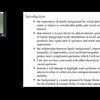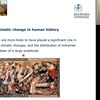socio
European integration and the reconstitution of socio-economic ideologies: Protestant ordoliberalism vs social Catholicism
Journal of European Public Policy Abstract Christian Democratic socio-economic ideology underwent a paradigm shift through the Europeanization of its party networks. Christian Democratic networks starte

Voting behavior, policy responsiveness and democratic anger. Interview with Armin Schäfer
European citizens with low socio-economic status are staying away from the polls in disproportionate numbers. Some of them say it is because politicians don't care about them anyway. Are they right? P

Markus Jäntti: Trends in absolute intergenerational income mobility in Sweden
Markus Jänttis research centers on income inequality, poverty, socio-economic mobility, and wealth inequality, especially in a cross-national perspective. He teaches econometrics and methods for inequ
Estimating Social and Ethnic Inequality in School Surveys: Biases from Child Misreporting and Parent Nonresponse
European Sociological Review 31: 312-25. Abstract We study the biases that arise in estimates of social inequalities in children’s cognitive ability test scores due to (i) children’s misreporting of soci
Resilient privatization: the puzzling case of for-profit welfare providers in Sweden
Socio-Economic Review, 2018. Vol 00, No. 0, 1–21. DOI: 10.1093/ser/mwy005 AbstractIn this article, we analyse the striking resilience of for-profit care and service provision in what has often been see

Adina Preda: Can there be positive human rights?
Research seminar with Adina Preda, Associate Professor of Philosophy at Trinity College Dublin. Abstract This paper aims to establish that there can be human rights to socio-economic goods or services
Population Geography Perspectives on the Central Asian Republics
The main traits of the population geography of the Central Asian Republics of Kazakhstan, Kyrgyzstan, Tajikistan, Turkmenistan and Uzbekistanare are outlined, and attempts are made to establish if par
Welfare States, Social Structure and the Dynamics of Poverty Rates. A comparative study of 16 countries, 1980-2000
This paper attempts to explain temporal and spatial variation of poverty rates in terms of unemployment insurance and socio-demographic factors, and test the ‘convergence hypothesis’ of the poverty ra
Adina Preda: Can there be positive human rights?
Research seminar with Adina Preda, Associate Professor of Philosophy at Trinity College Dublin.AbstractThis paper aims to establish that there can be human rights to socio-economic goods or services, ; the worry is that positive rights cannot have correlative duties assignable to everyone in the world. I then clarify the notion of correlativity and raise doubts about this claim. The paper concludes that there is no conceptual reason why positive rights cannot be general although they would probably look different from the socio-economic rights currently enshrined in international legal documents; the paper does not, however, argue that there are such moral rights.

Fredrik Charpentier Ljungqvist: Impacts of past climate variability – lessons for the 21st century
The talk summarizes key findings of state-of-the-art research on how climate variability and change have affected different aspects of human history in medieval and early modern Europe (c. 700–1815 CE








